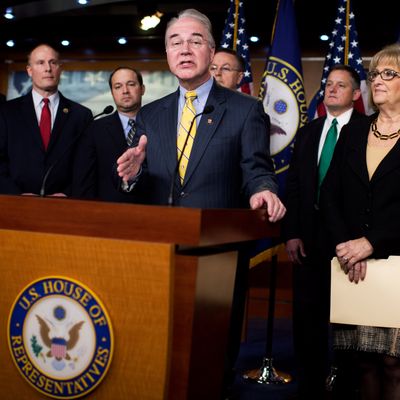
The Republican Party’s greatest health-care triumph is that it has managed to pass off its position on health care as some kind of undefined work in progress rather than a decision that has been made. Six years after the start of the health-care debate, Republicans keep telling reporters that they’re working on a plan. (Jeffrey Young has a hilarious, frequently updated timeline of the perennially just-over-the-horizon Republican Obamacare replacement plan.) In fact, the Republicans do have a health-care plan: It is to repeal Obamacare and replace it with what we had before Obamacare. They don’t want to admit that’s their plan, but it is. It’s right there, in the new budget released by House Republicans this week.
When you point out the Republican health-care plan, conservatives generally object. Oh no, they will tell you. Republicans have health-care plans. Lots of ‘em. Patrick Brennan, one of the more reasonable types at National Review, objected the other day to the premise that the Republican plan is to repeal Obamacare and do nothing. Brennan pointed out that Representative Tom Price actually has an Obamacare replacement:
It’s true — Representative Tom Price has a health-care plan. Of sorts. It’s a really sketchy plan that Price has not had scored by the Congressional Budget Office, which allows it to serve the purpose of letting Republicans cite it to refute the charge that they have no plan without being held accountable for its effects. This shows the primary obstacle to Republicans uniting around an Obamacare alternative. Reforming the health-care system is very tricky, and requires trade-offs. The Republican position on health care has relied almost entirely on the public’s status quo preference. Republicans have relentlessly attacked every discomfiting policy change in the Affordable Care Act and promised to change the system in ways people desire, without spelling out the very unpopular downside such changes would create.
The House budget illustrates the second obstacle to the adoption of a Republican health-care alternative. If Republicans wanted to replace Obamacare with Tom price’s health-care “plan,” they would include it in their budget. Tom Price probably has the clout to get his health-care plan onto the desk of the person in charge of writing the House Republican budget, who also happens to be Tom Price.
But the Price-authored budget ignores the Price health-care plan for the same reason the old Ryan budget ignored the Ryan poverty plan. It’s a thing Republicans want to say they’re for, but don’t want to make the sacrifices necessary to do it. The place where a party reconciles its competing priorities is its budget.
Now, the Republican budget does not actually reconcile its competing priorities. It is filled with smoke and mirrors. It won’t actually pony up the extra defense spending its hawks want, but it won’t deny their wishes, either, so the budget adds a one-year “emergency” defense hike, then whisks it away in subsequent years, even though nobody really thinks that would happen.
The biggest single gimmick is health care. Since Republicans are theologically committed to repealing every word of Obamacare, they have to repeal not only the law’s outlays, but also the tax hikes and spending cuts it uses to finance them. But they need those savings to pretend to cut the deficit. So the Republican budget claims to repeal them, and replace them with some other form of savings whose nature it won’t even hint at, let alone identify.
So their health-care plan is to repeal all of Obamacare, replace its savings with $1 trillion in magic money, and then spend zero on subsidizing health insurance for the millions of Americans who would become uninsured. If Republicans wanted to spend something on an Obamacare replacement — tax credits, high risk pools, whatever — they would need to set aside money for it. They chose not to. As hard as it is to design a health-care plan, designing one that cuts $1 trillion and spends nothing is really hard.
Indeed, even the existing budget fails to account for the party’s competing demands. It doesn’t set aside the extra defense spending that the hawks are angrily demanding. Nor does it account for the trillions in lost revenue that pretty much all the presidential candidates are promising. It’s pretty clear that, when it comes time to turn the Republican budget into reality, the first constituency with its hand out will be the tax-cutters, and the next one will be the defense hawks. There’s no way any money will be left over for health care. Republicans don’t even have the budget room to pay for the stuff they actually care about.






























